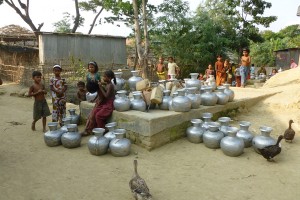Evaluation at a Glance: Bangladesh
WFP‐UNHCR Food Assistance Impact Evaluation in Bangladesh
The Contribution of Food Assistance to Durable Solutions in Protracted Refugee Situations: its impact and role in Bangladesh
|
CLIENT
World Food Programme and UNHCR
COUNTRY
Bangladesh
TEAM
Nicolai Steen Nielsen*
Ferdous Jahan
Covadonga Canteli
*Team leader
ORIGIN OF FUNDING
WFP and UNHCR
DATES
2011-2012
FULL REPORT
DARA’s Impact Evaluations
Impact evaluations look at the wider, longer-term results and effects of a project, programme or intervention on socioeconomic and political contexts. We have carried out three Impact Evaluations in Chad, Bangladesh and Cambodia.
Read about DARA’s Mixed Methods Approach to Impact Evaluations |
|
|

 Water point in Nayapara UNHCR camp
The World Food Programme (WFP) and the UN Refugee Agency (UNHCR) commissioned DARA an impact evaluation of the food assistance provided to Rohingya refugees living in two camps in Cox’s Bazar district of southern Bangladesh. This evaluation is part of four joint WFP–UNHCR impact evaluations (Chad, Ethiopia and Rwanda). This series aims to inform WFP and UNHCR on how to improve the effects food assistance has on refugee populations’ opportunities to attain self-reliance and longer-term durable solutions.

One of the most protracted refugee crises in the world
The Rohingya refugee situation in Bangladesh is one of the most protracted in the world, with more than 20 years of continuous camp settlements. Over the years, and in the absence of political solutions for the Rohingyas on both sides of the Bangladeshi-Myanmar border, agencies have seen humanitarian assistance becoming an integral part of refugees’ livelihoods without, however, contributing significantly to their self-reliance.

Food assistance contributes to short-term outcomes and dependency
the impact evaluation has demonstrated that the effects of food assistance on longer-term self-reliance has not materialised. Through a mixed method approach the evaluation found that:
- Comparing the situation of Rohingya refugees with that of Rohingyas living within local communities clearly indicates that the latter group has become self-reliant over the years as they have engaged in local income generating activities, whereas refuges (benefitting from aid), remains dependent on food assistance
- Rohingya living in host communities are more exposed to protection issues than the refugees in the camps, particularly women. Nonetheless, protection issues were also a serious concern for refugees in the camps
- The current food assistance model will not lead to self-reliance unless exit-strategies are defined food assistance exchanged with more enabling support.
- Particular attention needs to be given to the local context and its absorption capacity as poverty is widespread due to limited access to land and income generating activities.

Other routes to self-reliance
The impact evaluation makes recommendations to achieve self-reliance through solutions that provide better protection and services for all vulnerable groups:
- Develop a transition strategy so that the unregistered Rohingya can have protection, economic opportunities and access to basic services.
- Jointly develop an alternative strategy to the current food assistance modality where refugees become more active and involved in decision-making processes concerning their own situation and dispositions.
- Develop strategies to reduce the large concentrations of refugees in camps and of unregistered refugees to mitigate natural resources and protection problems.
FULL REPORT
|

Share this